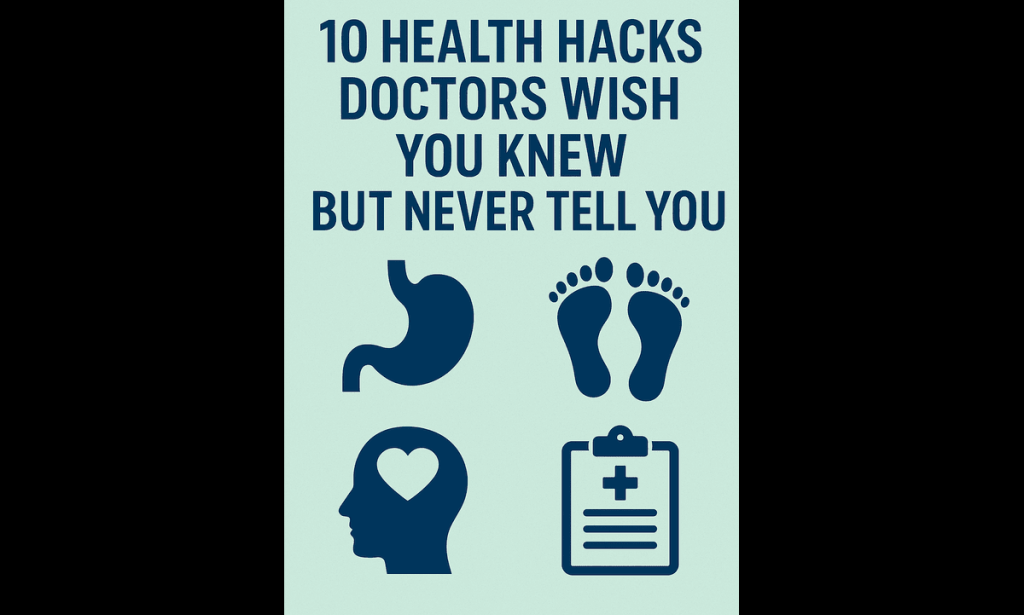1. Take good care of your gut because it's your second brain.
Although the gut-brain connection is well-known, most individuals are unaware of how important gut health is. Emotion, weight, and immunological function are all impacted by a healthy gut microbiota.
Tip: Include fermented foods in your meals, such as kimchi, sauerkraut, and kefir. To nourish beneficial bacteria, include prebiotics such as garlic, onions, and bananas.

2. Take a stroll following each meal—yes, even dinner.
Exercise is frequently advised by doctors, but this one incredibly easy method is incredibly effective: taking a 10-minute walk after meals.
Tip: After eating, set a timer and spend ten to fifteen minutes on a vigorous walk. Even a leisurely walk is beneficial.
Why it matters: It helps burn calories, improves digestion, and reduces blood sugar spikes. According to certain research, it may be just as beneficial for diabetics as drugs that lower blood sugar.

3. Sleep Deprivation Is Worse Than Diet
Few doctors highlight the need of sleep, but they do urge diet. Long-term sleep deprivation raises your chances of depression, obesity, and heart disease.
Hack: Establish a sleep schedule: Try magnesium glycinate, keep your room cool (around 65°F/18°C), and avoid using screens 60 minutes before bed.
Why it matters: Deep sleep helps your body burn fat, repair, and regulate hormones. Your health rapidly deteriorates if you don't have enough of it.
4. Your Heart Is Affected by Your Dental Health
A dazzling smile isn't the only benefit of brushing your teeth. The connection between gum disease and heart attacks and strokes is something that many physicians don't stress sufficiently.
Trick: To cut down on bacteria, floss every day and use a mouthwash without alcohol. For an additional detox, think about oil pulling with coconut oil.
Why it matters: Gum inflammation can cause inflammation in your arteries and other parts of your body.
5. The New Smoking Is Sitting—Take a 30-Minute Break
Sedentary habits are increasingly connected to a number of health issues, and prolonged sitting is now seen as just as harmful as smoking.
Tip: Even while at your desk, set a timer for every 30 to 40 minutes to get up, stretch, or take a 2-minute stroll.
Why it matters: Increases energy and attention, prevents insulin resistance, and improves circulation.
6. Hydration Requires Electrolytes, Not Just Water
Although doctors advise increasing water intake, excessive hydration without minerals can actually cause electrolyte imbalance, headaches, and exhaustion.
Tip: To naturally balance electrolytes, add a lemon or a pinch of sea salt to your drink.
The significance of electrolytes like as sodium, potassium, and magnesium lies in their need for neuronal activity, energy production, and hydration.
7. Your body knows hormones, not calories.
Calorie counting is out of date. Weight is regulated by hormones, not just math. The real players are leptin, cortisol, and insulin.
Tip: Avoid high-carb breakfasts and sugary snacks. To maintain insulin stability, choose meals that are heavy in protein and fiber.
Why it matters: Natural fat loss, especially belly fat, improved metabolism, and less cravings are all results of balanced hormones.
8. Free Medicine Is Found in Nature
Among the most disregarded health tips? going outside. Exposure to outdoors has been shown to reduce stress, increase immunity, and enhance sleep, although doctors hardly ever recommend it.
Trick: For mood stabilization and natural vitamin D, get 20 minutes of sunlight each day without sunscreen or sunglasses (early in the morning is ideal).
Why it matters: Living indoors causes many people to be low in vitamin D, which is necessary for immunity, mood, and bone health.
9. Breathing Wrong Is Making You Sick
Although they may take your heart rate, doctors hardly ever teach you how to breathe. However, the secret to focus, anxiety, and elevated blood pressure is breath control.
Trick: Work on your box breathing technique by inhaling for four seconds, holding it for four, then exhaling for four. For two to five minutes, repeat.
Why it matters: Trains your nervous system to remain composed under pressure, reduces cortisol, and enhances oxygen supply.
10. Being thankful helps you heal more quickly.
Does that sound good? It isn't. Gratitude promotes sleep, lowers inflammation, and increases immunity, according to science. However, at your checkup, nobody is giving out appreciation diaries.
Tip: List three things for which you are thankful each morning. Say them aloud. Bonus: Finish it right before bed.
Why it matters: Good feelings have an impact on physical health. Your body and brain are physiologically rewired for healing and resilience when you are grateful.


You must be logged in to post a comment.